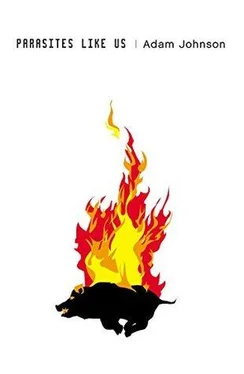Eggers shifted what he was chewing and went after it with his molars.
“Is this about Trudy?” I asked.
“Trudy? Why bring her up?” he asked. “Are you feeling guilty, Dr. Hannah?”
“What would I have to feel guilty about?”
“Nothing,” Eggers said. “Nothing. Except you did file the paperwork to revoke her Peabody Fellowship and give it to me.
“The school’s doing that. That’s out of my hands. Congrats, by the way.”
“You know me, Dr. Hannah. I yawn at money. Money’s obsolete to me.”
Eggers pulled something out of his mouth, inspected it, and put it back in.
“Don’t gloat,” I told him. “Everything will be hunky-dory once I explain things to her.”
“Trudy’s pretty upset. I mean, I was the one who broke it to her.”
“This isn’t even official yet.”
“She needed to hear it from someone who cared,” Eggers said.
“Please,” I said. “Anyway, that’s only half the story. Losing her Peabody is only the bad news of a good-news/bad-news thing. I’ll explain it to her.”
Eggers swallowed hard enough to make his eyes water, and then he opened the flap of his game bag. I could see a fuzzy tail sticking out of it, and it hadn’t escaped the notice of the school paper that all the squirrels on campus had disappeared during the time that Eggers, an adult omnivore, had taken up residence in the middle of the quad.
“I wouldn’t worry about Trudy,” Eggers said. “Trudy can take care of herself. She’ll bounce back.” He removed another sinewy morsel and slid it into his mouth. Though grayish-brown, it crunched like celery. He chewed it contemplatively. “I’ve got my own good and bad news,” he added.
I removed my glasses, folded them, rubbed the bridge of my nose.
“Just the good,” I said. “Only tell me the good.”
“I found something.”
Eggers was always finding things. He was the only person in town who walked everywhere, and over eleven months, his travels on foot had netted him countless arrow points, bison skulls, mastodon teeth, and a brass bell that may or may not have belonged to Meriwether Lewis. Sleeping in the same stretch of sand in South Dakota, you were likely to find a buffalo soldier’s pistol, a conquistador’s breastplate, the hooves of rhino-pigs from the early Eocene, T-rex teeth, and maybe even a Cambrian trilobite, frozen mid-wriggle at the dawn of time.
“Is it a spear point?” I asked.
“It’s a point, all right,” Eggers said.
“A Clovis point?”
Eggers shrugged, but in a way that said, You can bet the farm.
I threw a foot up on my desk to lace my snow-packs. “Show me,” I said.
We tromped downstairs and cut through the Hall of Man, a natural-history exhibit that my predecessor, Old Man Peabody, fashioned himself back in the 1960s out of an empty classroom. The Hall was about thirty feet long and lined with glassed-in exhibits. On one side was a series of models depicting glacial advance and retreat during the late Pleistocene. Peabody had crafted the balsa glaciers by hand, painted them white, and used little stickpins to represent Clovis movement from Siberia to South Dakota during brief openings in the ice. On the other side of the Hall was an amazing series of very lifelike models that followed the ascent of humanity: in a row were displayed Homo habilis, erectus , and sapiens , followed by Neanderthal, and finally Clovis, all posed in natural settings with several artifacts that Peabody had excavated himself. This hall is where I came to pace and think in times of doubt. Simply to cross the room was to travel a hundred thousand years back in time; it was a place where things always seemed clearer to me.
Out in the quad, Eggers and I walked quietly through the snow. The limbs of the maples had been shorn off, so they were whitened posts against what was for now a clear sky. The sidewalks were sanded and salted, though we veered off through the hackberry trees, walking under their weblike branches and listening to the tap-tap of thawing icicles as they dripped constellations into the snow below.
Eggers’ shelter was situated in the middle of Central Green, and ahead I could see its snow-crusted dome, made from six curving mammoth tusks draped with a mass of various animal hides that had been confiscated over the years by the Fish and Game Department. Also ahead in the courtyard was a large granite stone that held the plaque I’d placed in remembrance of my stepmother, Janis, and I was faced with my almost daily decision: should I offer a word to her, or should I close my eyes and simply walk on?
The proof of my cowardice was that my decision to talk to Janis always came down to whether or not I was alone. At least I didn’t put a bench here, which I’d considered.
Eggers could see the apprehension on my face. “Maybe I’ll just go check my snares,” he said, and headed toward the arborvitae hedge.
“No, don’t,” I told him. “I’m okay.” And like that, I resolved not to speak to Janis today. As I neared, though, I did look at her face, fixed in the mild relief of bronze. The birds had been crapping again, something I hadn’t planned on when I’d commissioned the memorial. But, really, did it matter? How could someone be honored by impressing a face on a plaque or a name to an anthropology fellowship? I couldn’t even decide if I should use an image of her from when she was young or when she was older. Eventually, I chose a picture taken on the day she graduated from stenography school, a time before she even met my father. She looks young and expectant in the image, but the ironies didn’t escape me: since she left my life, I’d chosen to remember her with an image from before I’d entered hers. So now we looked upon each other as strangers.
My father had Janis cremated, something I’m against, but would it have made a difference if we’d buried her? Ten thousand years from now, when people exhumed her bones, what would they know of her life, her spirit? There would be her rings, traces of gold dentistry, perhaps. Would they know of her love of plants, that she longed to see Egypt, or that when she napped on the couch her fingers would type her dreams on her lap? Would the future know her goal in life was an impossible one: to be my mother after my real mother made a stranger of herself? Should I have put medicine bottles and a bedpan in her grave, so the future would understand her final struggle? Should I have chiseled out her story, start to finish, in granite, and what language will the future speak?
The snow thinned as we crossed Central Green, and it wasn’t until you neared Eggers’ dwelling, which he called his “lodge,” that you realized it was situated, as if by chance, atop the one spot on the whole campus where there was no snow. There were underground steam tunnels that sent heat to the dormitories, and Eggers claimed it was just a coincidence that he had built his lodge over the main heat exchangers. Nearing, we stepped through shards from his flint knapping, and an array of his stone tools was lying around — scrapers, cutters, and percussion strikers. Finally, there was a rather shocking mound of bones that Eggers had accumulated over the year. I nosed through them with my boot — most of the bones were surprisingly small, shining dully from under a gelatinous goo that beaded water away, and though rodent anatomy was technically out of my field, I spotted among the prairie-dog and squirrel skulls more than one feline. Eggers was saving them so he’d be able to calculate his caloric intake, once his year was finished and he could handle lab equipment again. These bones were the cornerstone of his dissertation, and I counted them as a real document, as good a testament to Paleolithic culture as any. To keep scavengers away, Eggers urinated on the heap.
Читать дальше












